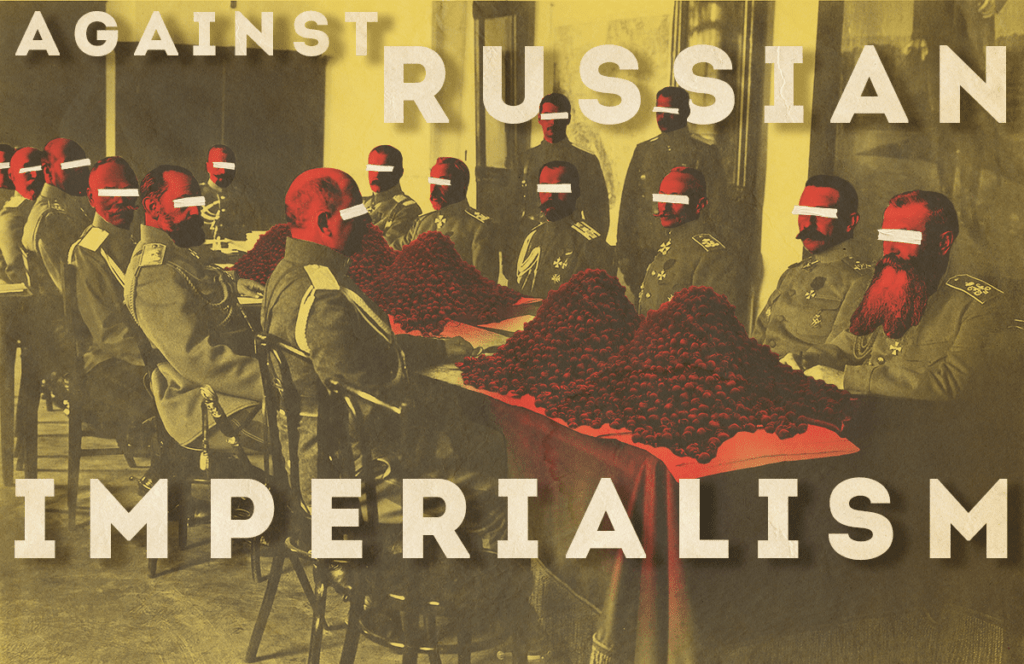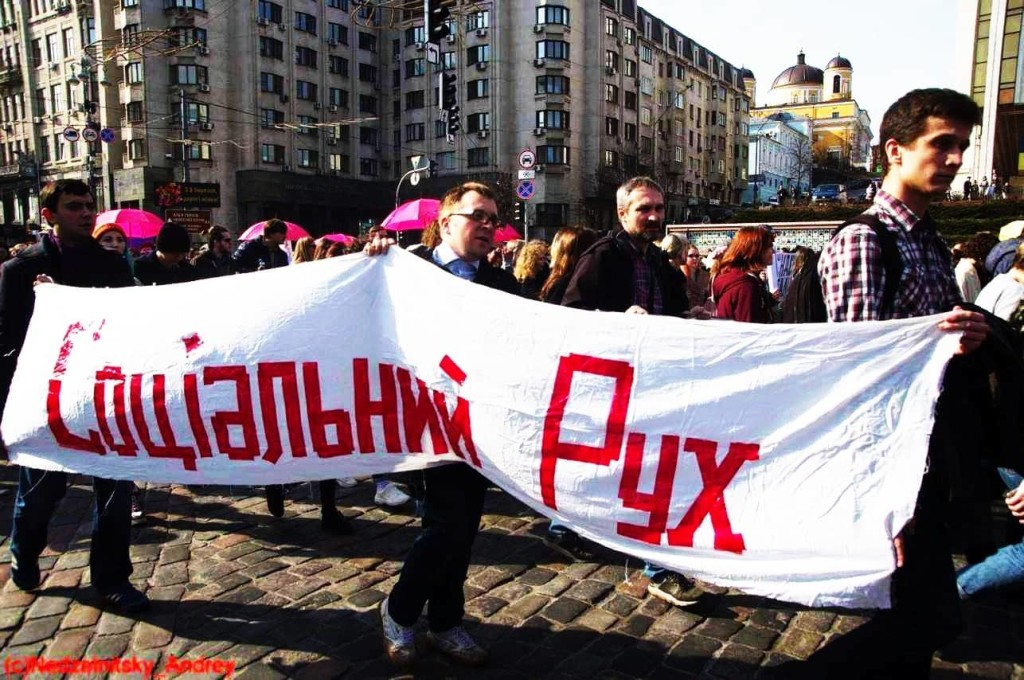
Illustration by Kamshat Nurlanova, care of LeftEast.org
The February 24 one-year anniversary of the Russian invasion of Ukraine saw no respite for either the volunteer and professional Ukrainian troops or the civilian population. The Russian-occupied territories in eastern and southern Ukraine and the areas along the military front have become a veritable wasteland; basic infrastructure, the economy, and everyday life have been hobbled by with those civilians unable or unwilling to flee surviving in the most primitive conditions, if at all. They and civilians across the country are subject to the random terror of air and artillery attacks on apartment blocks, schools, hospitals, and markets; Russian targeting of civilian infrastructure, especially energy, has made life tenuous and nerve-racking even far from the front. The steady and horrendous toll of Ukrainian military casualties has been surpassed by those on the Russian side, many of them forced recruits or prisoners thrown into suicide missions as human decoys. And there remain some eight million Ukrainian refugees, mostly women and children, outside the country, and six million internally displaced—together, almost one-third of the country’s pre-war population.
I wrote about the dilemmas inherent in the Western Left’s initial response to the invasion and war in the May 2022 Public i. One year on, the divisions over the issue among US progressives are as big and as heated as ever. The pages of publications like The Nation, Jacobin, and Counterpunch feature dueling opinions and analyses, with diametrically opposed positions appearing in close proximity within each. While this shows a welcome diversity of views—not always a characteristic of Left discourse—it also indicates the complete lack of a united position, that could lead to an active and effective politics. The Guardian’s Jonathan Steele writes that the Left has been “uncharacteristically subdued” on the issue, and fallen into “silence.”
The basic positions as represented in the Left press have not substantively changed in the last year. For convenience, I will use the admittedly oversimplified terms “pro-peace” and “pro-Ukraine.” Many progressives may find themselves on a spectrum between those poles—and of course everyone at some level supports both peace and Ukraine.
The pro-peace Left still maintains that Putin’s invasion was provoked by NATO expansion to Russia’s borders; that the 2014 Maidan “revolution of dignity” was actually a US-orchestrated coup, and/or taken over by the Ukrainian extreme Right; that Ukrainian leaders, including current President Volodymyr Zelensky, pushed by Western powers, sabotaged the 2014 and 2015 Minsk Accords that meant to provide a compromise solution for the contested eastern regions; that the threat of nuclear escalation means that peace must be reached at any price; and that the reluctance of the Global South to get behind the Western campaign supporting Ukraine shows that for the bulk of humanity, “this war is not our fight,” so it should likewise not be the Left’s.
To this, the pro-Ukraine Left answers that NATO expansion in an eastern direction basically stopped in 2004 with the admission of several Eastern European states who were already in or soon to join the European Union (further expansion has been southwards, away from Russia); that Maidan was a popular uprising against subjugation to Russia and for democracy and self-determination; that the Minsk Accords were incompatible with Ukraine’s sovereignty—a diplomatic expression of the Russian military superiority, and Russia couldn’t be trusted to carry out its side of the bargain; that while Russia uses its nuclear threat to blackmail Ukraine and the West, it wouldn’t go through with actual nuclear deployment, which would make the country an absolute pariah instead of just a partial one, while giving in to this blackmail would incentivize non-nuclear states across the Global South to gain access to nukes to avoid the subjugation that has befallen Ukraine; and that popular support for Ukraine in the Global South, which is to be distinguished from their governments’ positions, is remarkably high.
The twentieth anniversary of the US invasion of Iraq, coming a month after the first anniversary of the Russian invasion of Ukraine, has occasioned a new lens through which to view the current situation. The pro-peace Left argues that the US government (and the mainstream media), having still not acknowledged the criminality and dire short-term and long-term consequences of that act, has no standing to intervene in the Ukraine-Russia conflict. The pro-Ukraine Left counters that past wrongs do not justify new ones; and that failure to oppose this invasion would leave Ukrainians in position to in coming years suffer the same ills as the Iraqis have. It is Vladimir Putin who is the George W. Bush of 2022.
However much we distrust and discount the interests and intentions of the US and NATO here, Putin’s Russia is likewise an imperialist power within and beyond the old Soviet borders. Two brutal and devastating assaults on Chechnya in the 1990s and 2000s; interventions leading to “frozen conflicts” lasting decades and still ongoing in Georgia and Moldova; savage involvement in the Syrian conflict on the side of the dictator Bashar al-Assad; and, most recently, action in Kazakhstan to suppress a workers’ uprising in January, 2022 all attest to this. And Russia until the early 2010s—well after the latest expansion—cooperated with NATO under the auspices of the Partnership for Peace program; many NATO countries supplied Russia with arms even after 2014. So to see Russia as a bulwark of the global anti-NATO resistance is to play into the anti-colonialist fiction of Putin’s propaganda, in which he is “liberating” Russian-speaking Ukrainians from Western hegemony. (And it must be pointed out that it is the invasion itself which has roused NATO from its relatively dormant state of late—at least in terms of pressure on Russia’s borders.)
From my point of view the key point is recognizing Ukrainians’ agency and right to self-determination. The pro-peace side’s oft-repeated formulation of the conflict as a “proxy war” between Russia and the West relegates Ukrainians—and in fact the Russian people, who despite widespread acceptance and passivity do not necessarily share the regime’s aggressive posture—to the status of pawns in geopolitical power games. This rhetoric, while not always adopting the term, relies on a doctrine of “spheres of influence” that characterizes the so-called “realist” school of international affairs, aligning a part of the Left with figures like political scientist John Mearsheimer, and even Henry Kissinger. As of December, surveys showed 87 percent of Ukrainians, across regions, classes, and linguistic communities opposed to any territorial concessions in exchange for peace. Agreeing to such a settlement would surely lead to the fall of the Zelensky government and the empowerment of the so-often lamented Ukrainian extreme Right. The idea that the West should force terms on Ukraine, and that Ukrainians should sacrifice their national integrity and their freedom in consideration of global concerns about nuclear safety, contradicts essential Left values of self-determination, grassroots participation, and basic democracy, not to mention an authentic anti-imperialism.

Activists of Sotsialnyi Rukh marching to support Ukrainian workers’ struggles
Ukrainian socialist Taras Bilous, whose “Letter to the Western Left from Kyiv” I referred to in my previous article, embodies a forthrightly critical yet pro-defense position. A socialist, he started working with local anarchists—who proved more flexible and active than his socialist comrades—to organize humanitarian relief and military defense support in response to the invasion. He has since joined a military unit, as have many other leftists, some of whom have paid with the ultimate sacrifice. Bilous’s group, Sotsialnyi Rukh (Social Movement), issued a joint statement with the Russian Socialist Movement, in a statement on the site LeftEast, calling the struggle against the occupiers a “people’s war.” He and his comrades retain a strong critique of Ukraine’s democratic shortcomings, subjection to the “NGO complex” as an agent of Western “soft power,” and its government’s “anti-labor and anti-social policies, corruption, and ideological Thatcherism”—a familiar neoliberal project born of crisis and disaster. Yet they take up arms and support the war effort.
Understanding, and to a certain point agreeing with, the Western Left’s opposition to US and NATO imperialism, the Ukrainian/East European Left pleads to at least join it in pushing for the cancellation of Ukraine’s foreign debt, and helping in advance to lay the basis for “progressive reconstruction.” which could counter a prospective neoliberal assault. Such a more minimalist alliance might offer a positive path; some aspects might appeal to the centrist and even right-wing governments of Poland, the Baltic countries, and other East-Central European European Union (EU) states (Hungary, due to its right-wing populist government’s longstanding entanglements with Putin, is an exception)—and certainly to their populations, who have been the strongest supporters within the EU of NATO’s arming of Ukraine. (It has also been pointed out that the strong majority support in these countries for their own absorption into NATO muddies the picture of NATO’s eastern expansion being a purely imperialist project.)
The argument that Ukrainians, and especially Ukrainian refugees in their millions, are benefiting from a kind of “white privilege” vis-à-vis refugees from and victims of violence in the Global South ignores social, political, and cultural dimensions more similar than different between East Europeans’ historical and current experience and those in the rest of the formerly colonized world—and the fact that East Europeans were long considered by the West as not or not fully white. As someone long engaged in the study and life of Eastern Europe, I must demand that Ukrainians, and other East Europeans, and their opinions and interests be taken seriously by the Left (and in the West generally).
That does not mean that there is no need for a peace movement and pressure for difficult, engaged, and persistent diplomacy by Western leaders—until now completely lacking. And we can perhaps agree that the most problematic weaponry—like depleted uranium munitions, which the UK just announced it was sending—should not be introduced into Ukraine. We should not become cheerleaders for NATO or US/Western dominance in the world. But we must start from a place of understanding and respect for Ukrainian agency.

In a further article later this year I will expand on the issues of Ukrainian refugees and EU politics.
891 total views, 1 views today
